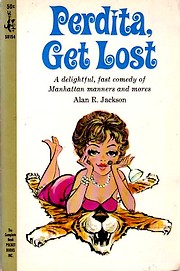There are few good reasons to read a 45 year-old light comedy. Like an opened bottle champagne, light comedy doesn’t keep well. Plot and characterization are usually paper-thin to start with. Moods and manners are much of the age in which the book is written and lose most of their meaning within a few years. One character in this book says to another, “I half expected you to begin banging your shoe on the desk.” How many readers would get that reference today?
 I picked up Perdita, Get Lost
I picked up Perdita, Get Lost in the basement of the Montana Valley Book Store in little Alberton, Montana–one of the dwindling number of bookstores where you can plunge into stacks of books from more than a decade or two ago. I probably bought it as much for the fact that it’s a small gold-backed Pocket Book Cardinal Edition, which is up there with the little squarish Dell paperbacks from the early 1960s and the Yale Chronicles of Americas series among my favorite book formats.
The story, about a spunky young woman named Perdita Chandler (Chan for short) and Jerry Blake, the bachelor millionaire who’s sort of her uncle–but not–is about as well constructed as my first balsa wood airplane model. Key moments turn on such creaky pivots as the fact that Blake’s cat is also named Chan and the unexpected gift and theft of a rather ugly classical Greek statue. Even the construct of the millionaire relative with nothing but time on his hands could be something from a B-movie society comedy of the 1930s. As for the context–well, multiple martinis are downed in an average afternoon and all the young women are expected to be dreaming of a big suburban home in Westchester County complete with three kids and a collie. I kept expecting J. Pierrepont Finch to pop up.
So no, Perdita, Get Lost is no timeless classic. The only thing going for it–which is about all any light comedy with legs can claim–is the writer’s style. In Alan R. Jackson’s case, he comes off quite the clever fellow, far more in the know about his characters than they could ever hope to be about themselves. But at least he manages a light touch through most of the book. Here, for example, he dissects a conversational misstep:
“If we had a golden eagle in this apartment, we would all have hay fever. They’re full of pollen. I know!”
She had committed a social gaffe, which in English is known as a boner and in German undoubtedly by a polysyllabic portmanteau word that only another German would understand.
Her boner was to make a simple, positive, declarative statement.
This stops conversation.
A social gathering, such as Carla had gathered for whatever devious reasons, is like a saraband. There are certain movements, which must be countered by others. Conversation must flow like the waters of the Villa d-Este. A positive statement (like Carla’s “I know”) stops it.
Even had there been present an expert on golden eagles and their pollination (and there was none), he would have hesitated to dispute his assured hostess. So the “I know,” although strictly out of the blue (where the golden eagles live) brought everything to a full stop.
Jackson wrote another novel, East 57th Street, a year or so before Perdita. From the title alone, I suspect it’s also a light comedy of life in early sixties Manhattan. I’ve no idea what became of him after publishing Perdita. While he’s no Wodehouse, he’s certainly of that ilk, if of a different continent and different decade, and I’ll probably give East 57th Street
a try one of these days. Marshmallows do have an occasional place in a well-rounded diet.

Curious that you should mention Wodehouse in your review: Based entirely on your cited quotations, I think this is the same Alan Jackson who used the pen name Rosie M. Banks, which you may remember is the name that Bingo Little’s wife used to write torrid volumes such as “Madcap Myrtle” and “Only a Factory Girl.” Alan cum Rosie put out four nurse novels, all of which I have read and reviewed on my site. I have always enjoyed his prose, and have been curious to discover more about him — and now I will definitely look for this novel!